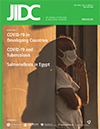Colonization by multidrug-resistant microorganisms of hospitalized newborns and their mothers in the neonatal unit context
DOI:
https://doi.org/10.3855/jidc.12091Keywords:
Premature, multiple antibacterial drug resistance, neonatal intensive care, mother-child relationsAbstract
Introduction: The mother plays a fundamental role in the constitution and regulation of her child's healthy microbiota, however, preterm newborns are separated from their mothers soon after birth and transferred to Neonatal Intensive Care Units, being exposed the constant risk for the development of multidrug-resistant microorganisms’ infections. The aim of this study was to explore the multidrug-resistant microorganism colonization of hospitalized babies and their mothers in the neonatal unit context.
Methodology: A prospective case study conducted with hospitalized babies and their mothers in the Neonatal Unit at a university hospital. The sample was composed of 433 binomials (mother-child). Colonization culture samples were taken at the moment of the baby’s discharge, via two swabs in the oral, nasal, axillary, inguinal, and rectal regions.
Results: The colonization incidence among the binomials, 30 (6.9%) were both colonized by multi-resistant microorganisms. Mothers of colonized babies (24.4%) demonstrated a higher chance of colonization in comparison to mothers of non-colonized babies (11.9%) (p = 0.002). Relationships were drawn between baby colonization and prematurity, extremely low birth weight, and non-exclusive maternal breastfeeding (p<0.05). ESBL-producing Gram-negative microorganisms were more frequent in the cultures of the binomials, with 35.9% of the babies colonized with Klebsiella spp. ESBL and 42.0% of the mothers with Escherichia coli ESBL. Furthermore, 50% of the binomials were colonized with E. coli ESBL.
Conclusion: The prematurity, extremely low birth weight, and non-exclusive breastfeeding at hospital discharge were associated with baby colonization by multidrug-resistant microorganism. Furthermore, mothers of colonized children presented higher chances of colonization.
Downloads
Published
How to Cite
Issue
Section
License
Authors who publish with this journal agree to the following terms:
- Authors retain copyright and grant the journal right of first publication with the work simultaneously licensed under a Creative Commons Attribution License that allows others to share the work with an acknowledgement of the work's authorship and initial publication in this journal.
- Authors are able to enter into separate, additional contractual arrangements for the non-exclusive distribution of the journal's published version of the work (e.g., post it to an institutional repository or publish it in a book), with an acknowledgement of its initial publication in this journal.
- Authors are permitted and encouraged to post their work online (e.g., in institutional repositories or on their website) prior to and during the submission process, as it can lead to productive exchanges, as well as earlier and greater citation of published work (See The Effect of Open Access).








